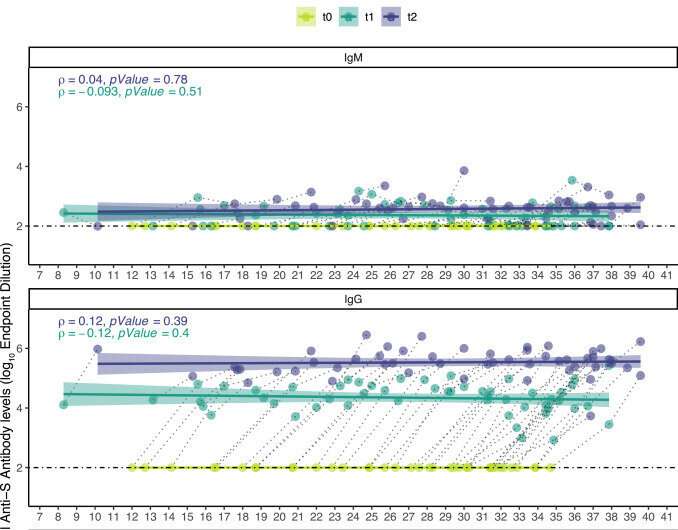Long-term immune response to SARS-CoV-2 mRNA vaccination found to be unaffected by pregnancy

Within a study by investigators at Weill Cornell Medicine and NewYork-Presbyterian, the long-term immune response to SARS-CoV-2 mRNA vaccination was similar in pregnant individuals and non-pregnant individuals of reproductive age. The similarity in protection is noteworthy, given that pregnancy alters the immune system, and potentially the response to vaccination.
The findings, published Nov. 2 in the American Journal of Obstetrics & Gynecology MFM, add further support to current recommendations for SARS-CoV-2 vaccination at any point during pregnancy, including booster doses after the initial two-dose series, to help protect pregnant people from severe COVID-19. The researchers also found that SARS-CoV-2 mRNA vaccination during pregnancy transferred protection to unborn babies, an essential benefit since babies must be at least six months old to receive their first COVID-19 vaccination.
"We and others have shown mRNA vaccination results in a strong initial immune response in pregnant individuals but the longer-term protection was unclear," said co-lead study author Dr. Yawei Jenny Yang, assistant professor of pathology and laboratory medicine at Weill Cornell Medicine and a pathologist at NewYork-Presbyterian/Weill Cornell Medical Center. "We believe our study is unique in that it longitudinally evaluates the longer-term immunity in pregnant and non-pregnant individuals up to 10 months after their first two SARS-CoV-2 mRNA vaccines."
For their study, which involved extensive collaboration among multiple departments, Dr. Yang and colleagues collected and analyzed blood samples from 53 pregnant and 21 non-pregnant individuals receiving care at Weill Cornell Medicine who received their first two doses of the Pfizer or Moderna SARS-CoV-2 mRNA vaccine between December 2020 and June 2021. The vaccines targeted the original Wuhan strain of SARS-CoV-2, and no study participants had ever had COVID-19. Researchers collected blood at the times of the first and second vaccine doses, two weeks after the second dose, and at regular intervals over 42 weeks.
The investigators found that the vaccination resulted in robust levels of immunoglobulin G (IgG) antibodies specific to the spike protein on SARS-CoV-2, called anti-spike IgG antibodies, the most abundant, potent and longest-lasting antibodies the immune system makes after mRNA vaccination. The antibodies bind to the virus and attack it directly or block it from infecting cells.
The study results showed that anti-spike IgG antibody levels were similar in pregnant and non-pregnant individuals. The peak immune response to vaccination occurred about two weeks after vaccination, regardless of when vaccination was initiated during pregnancy. The quantities of these antibodies declined at a similar rate in pregnant and non-pregnant individuals, down to 64 to 77 percent of peak by about six to eight months after vaccination. This finding further supports the benefits of booster doses for maintaining optimal protection against COVID-19, regardless of pregnancy status.
Additionally, Dr. Yang and colleagues found anti-spike IgG antibodies in cord blood from the vaccinated pregnant individuals who gave birth at NewYork-Presbyterian Alexandra Cohen Hospital for Women and Newborns, confirming earlier reports of SARS-CoV-2 mRNA vaccination passing on strong protection to babies. "We are grateful to the participants who enrolled in the study so they could help others," Dr. Yang said.
"Early in the pandemic, clinicians recommended vaccination based on the need to protect pregnant individuals from the devastating effects of COVID-19," said senior study author Dr. Laura Riley, chair of the Department of Obstetrics and Gynecology and the Given Foundation Professor in Clinical Obstetrics and Gynecology at Weill Cornell Medicine and obstetrician and gynecologist-in-chief at NewYork-Presbyterian/Weill Cornell Medical Center. "Now we can definitively say that following vaccination, pregnant individuals mount as robust an immune response as non-pregnant individuals. Our data, and the accumulated research on COVID-19 vaccines in pregnant individuals, indicate the vaccines protect pregnant individuals from the effects of COVID and protect their babies as well."
"We hope our findings encourage more pregnant individuals to get vaccinated," she said.
More information: Malavika Prabhu et al, Longitudinal antibody response kinetics following SARS-CoV-2 messenger RNA vaccination in pregnant and nonpregnant persons, American Journal of Obstetrics & Gynecology MFM (2022). DOI: 10.1016/j.ajogmf.2022.100796



















